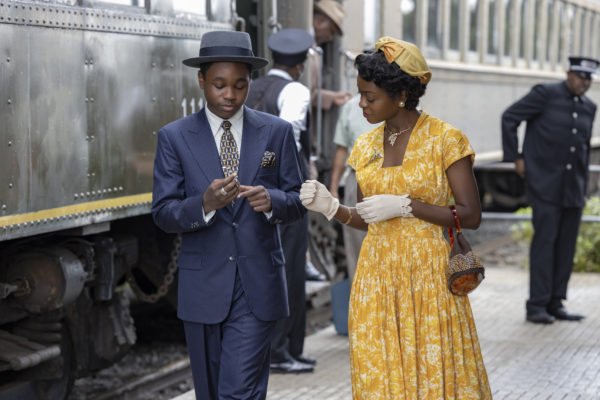By Emily Rodz
In director Chinoye Chukwu’s Till, a grieving mother’s embarks on a quest for justice following the abduction and lynching of her son, Emmett Till, in 1955 Mississippi—an event that would help kickstart the Civil Rights movement. Starring Danielle Deadwyler as Mamie Till, the historical drama comes to theaters in limited release this weekend from United Artists.
Chukwu, speaking at a press conference at the New York Film Festival, where Till had its debut, wanted to center the film on Mamie Till’s emotional journey, stating: “Without Mamie Till, the world wouldn’t know who Emmet Till was.” Although the story being told is one of tragedy, Chukwu wanted the film to foster “as much joy and community and love and hope and possibility alongside the inherent pain and sadness.”
Respecting the people behind the history was an important factor in making Till. Co-writer Keith Beauchamp, who knew Mamie Till personally before she passed, recalls that Mamie wanted Emmett’s story told through her eyes. Says Beauchamp: “There’s no other story that speaks more to this generation and time than the story of Emmett Louis Till.” With this in mind, Chukwu de-emphasized the spectacle of “physical violence inflicted on Black bodies,” while being “very intentional about Emmett’s body” and how it would be presented on-screen; the child’s murder is not shown, and indeed is not introduced into the film until his body is presented in church for mourners to see. By taking this approach, Chukwu could “[recreate] the experience of the world seeing what happened…collectively.” Till’s refusal to engage in spectacle allows the audience to acknowledge the horrendous act, while also serving as a call to action against injustice. “At the core” of Till, says Chukwu, is “a love story” about mother and son.” We get to really see, feel, experience the love and humanity that existed between Mamie and Emmett.”
The actors’ performances in Till were fueled by the racial injustices that have dominated, and continue to dominate, the history of the U.S. John Douglas Thompson, who plays Moses Wright, notes that “just knowing the story, or aspects of the story, made bringing the emotional aspects for my character…not easy, but definitely attainable.” Tosin Cole (playing civil rights leader Medgar Evers) concurs, commenting “it was easy to draw on these emotions [hurt, fear, anger, and sadness]” because of the “unity that they had.” With the utilization of an onset therapist, the actors were able to have the emotional support that they needed in order to draw upon such wrenching emotions. Chukwu recalls how Deadwyler would aid in conversations “before, during, and after the making of the film about what we needed mentally, emotionally, spiritually… to come out as whole as possible.” Jalyn Hall, who plays Emmett Till and is the same age as he was when he was murdered, speaks about his role as being an “emotional rollercoaster,” wherein he had to balance “being curious and happy” with the “confusion and fear” of being placed in Emmett’s shoes. Above all else, the actors emphasized a sense of need and urgency in being able to tell this story not only in the way that Mamie would have wanted it, but also in the way that the world needs to hear it.
Till opens in theaters on Friday, October 14th with an additional expansion on October 28.



Share this post